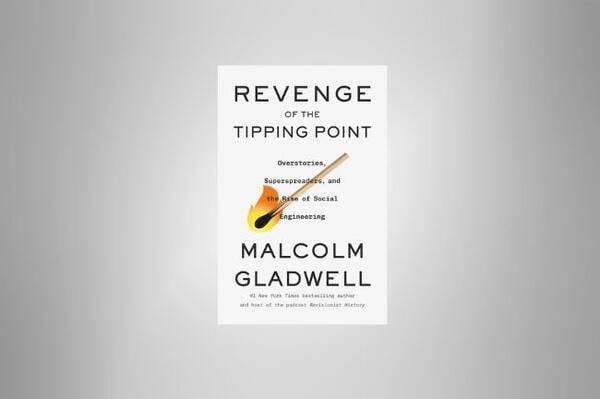Revenge of the Tipping Point: Overstories, Superspreaders, and the Rise of Social Engineering by Malcolm Gladwell
Published in October 2024
Praising a Malcolm Gladwell book may not be the No. 1 way to seem helplessly uncool with your academic colleagues, but it is close. Share with any random social scientist—my people—that you are reading Gladwell, and you are likely to hear a long lecture detailing the flaws and shortcomings of Gladwell’s writing.
Ignore the skeptics. Reading a Gladwell book is like listening to a well-crafted song: You can enjoy the experience without agreeing with the lyrics.
Gladwell’s most recent book is Revenge of the Tipping Point. As with all Gladwell books, the audiobook experience will be your best reading bet. Gladwell is a fantastic writer. His narration style is conversational, intimate and energizing. Revenge of the Tipping Point is an all-new book, taking as its starting place the 2000 Tipping Point publication that launched Gladwell into the nonfiction stratosphere. Like the original, Revenge of the Tipping Point seeks to uncover the hidden forces that drive social trends. The book uses stories and a mix of academic research and data to explain phenomena as diverse as the COVID epidemic, the spread of opiate addiction and the rapid cultural and legal embrace of gay marriage.
For critics of Gladwell (likely a large proportion of Inside Higher Ed readers), Revenge of the Tipping Point will generate a familiar set of objections. We academics will complain that Gladwell cherry-picks data to support a narrative and fails to include information that may complicate the story. Gladwell’s approach is to structure his stories about social phenomena like a murder mystery, with Gladwell playing the role of Sherlock Holmes. Piecing together the clues, Gladwell reveals the guilty culprit (the policy or cultural phenomenon) responsible for the crime (the trend or social outcome in question). As academics, we know that various variables, forces, structures and random causes drive most social trends. Gladwell’s books are satisfying precisely because he is a master of filtering out complexity. You feel smarter after reading Gladwell, even if you aren’t.
Knowing all this going into reading Gladwell, including Revenge of the Tipping Point, can help ensure that reading his books is enjoyable and productive. For those of us in higher education, Gladwell has a good deal to say about how universities (well, elite universities) work. I found his explanation as to why highly selective schools field a multitude of sports teams across every conceivable athletic endeavor—from squash to Nordic skiing to equestrian to rugby—reason enough to invest time in Gladwell’s latest book.
We should not confuse Gladwell’s critiques of elite higher education with the ongoing attacks many universities are navigating from the executive branch. One hopes, however, that Gladwell might be rethinking his history of drawing stark moral absolutes when condemning elite institutions while largely ignoring societal positives and complexity. I suspect that the Ivy League is easier to attack when it is cast as Goliath, as opposed to the defender of academic freedom and bulwark against government overreach that recent events have so clearly revealed our universities to be.
What are you reading?


